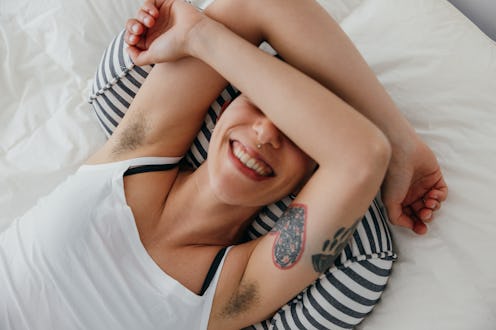(Hair)
So, Do People Even Care About Body Hair Anymore?
Letting your fuzz flourish isn't as subversive as it once was.

Back in 2015, Miley Cyrus posted a selfie to Instagram that showed off nipple pasties, a middle finger, and a small smattering of hair under each of her armpits. The Internet promptly flew into a tizzy, and not over her lack of bra or her obscene finger. It was the body hair that had people freaking out. Plenty of commenters on her post called the look “disgusting,” saying there was “no excuse for that.”
And while Miley was far from the first female-presenting celebrity to show off her preferences against razors (show some respect to Julia Roberts, please!), it did kick off an interesting moment in culture — one in which people began questioning their body hair choices, and asking why we adhere to beauty standards that demand women shave their naturally-occurring fuzz.
During the last two years, with many stuck inside the house, plenty of people decided to forgo shaving their body hair all together. Because, why bother — right? A lot of the grooming practices that were once part of our routine and require, you know, leaving the house was suddenly not a priority anymore. Salons were shuttered and social lives put on hold.
Now, with the world slowly returning to some version of normal, the conversation around body hair has resumed with a new generation of young adults making their voices heard, most notably on social media. The TikTok community is vocal about snubbing its nose at most modern beauty standards, creating a safer space for folks to express themselves in different ways, and whether or not body hair is “acceptable” is very much a part of this ongoing dialogue.
Who Is Embracing Body Hair In 2022?
“We have definitely seen a difference in attitudes around body hair with younger consumers (ages 18-24) embracing body hair and removing less, versus an older consumer (age 24-44) that continues to consistently remove body hair by shaving or waxing,” says Helene Caillate, general manager of Flamingo. These numbers aren’t just anecdotal. A 2021 survey from YouGov found that 46% of younger Americans between 16 and 34 years old have no preference on whether women should get rid of armpit hair. For 35- to 54-year-olds, that number was 54%. Leg hair, on the other hand, is seen as less palatable across the board, with 59% of Americans saying it’s unattractive for a woman to have hair on her legs.
And while older Millennials and Gen-Xers may feel hamstrung by the beauty standards they’ve internalized from their youth, younger Millennials and Gen-Zers have more of an anything-goes view on body hair. That has a lot to do with the communities they’re tapped into, and how openly people on social media discuss different ways of expressing themselves.
“I feel endlessly grateful to the queer people and women of color who opened my eyes to the possibilities of womanhood and self-determination that are so underrepresented in the mainstream.” — Emma M.
On TikTok alone, there is a growing number of body hair positive influencers. The hashtag #bodyhairisnatural has nearly 120 million views on the platform, while #bodyhairpositivity has 84.5 million views. These influencers are helping folks break down their ideas of what it means to be feminine.
“I feel endlessly grateful to the queer people and women of color who opened my eyes to the possibilities of womanhood and self-determination that are so underrepresented in the mainstream,” says Emma M, a 23-year-old from Brooklyn, NY. She no longer shaves her body hair after being inspired by others, including her friends, to ditch her razor. “We talk about our decision to let our body hair grow, but it really just feels normal in Brooklyn,” she says. “It’s baffling that the norm of our culture requires so much energy from women.”
For Margaux Anbouba, 31, beauty editor for Elle and a vintage clothing collector and connoisseur, the decision has both an aesthetic and political philosophy behind it. “I wear a lot of super-feminine, specifically 1950s and ‘70s dresses, and I like having a little peek of armpit hair,” she says, explaining that she keeps it at a specific, stylized length with a body hair trimmer. “I love the clothes, but it felt weird to be a modern woman who is a feminist wearing these ultra-feminine clothes. So the armpit hair is a little modern wink.”
How Body Hair Acceptance Is Going Mainstream
The thoughtfulness and intentionality behind body hair is something that modern hair removal brands are looking to fold into their ethos. “With the younger consumer, we’ve seen them embrace body hair as a form of self-expression that can both signal what they are feeling on the inside, but also push back against the norm,” says Georgia Gooley, co-founder of Billie. “We’ve shown body hair in all of our work from day one. At the time, we were the first shave company in over 100 years to show women’s body hair. So many brands have since followed suit, which I think is indicative of the shift we’re seeing.”
So while older Millennials and Gen-Xers see wearing one’s body hair as a trend, it stands to reason that the younger generations will neutralize the idea of natural peach fuzz, leaving it as a choice that’s on par with how you choose to style the hair on your head.
“I am hopeful that this signifies a positive cultural change,” says Emma. “Just as it has become less taboo for men to express emotion, hopefully women are more empowered to inhabit our bodies for ourselves, and feel less pressure to conform to an image. We are all human, and that is something to celebrate.”